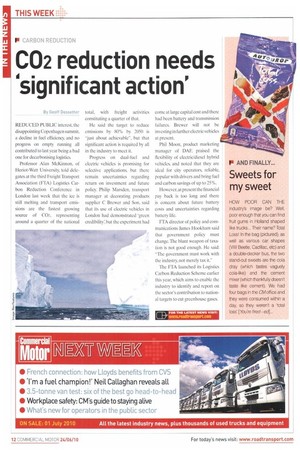P CARBON REDUCTION
Page 12

If you've noticed an error in this article please click here to report it so we can fix it.
CO2 reduction needs 'significant action'
By Geoff Dossetter REDUCED PUBLIC interest, the disappointing Copenhagen summit, a decline in fuel efficiency, and no progress on empty running all contributed to last year being a bad one for decarbonising logistics.
Professor Alan McKinnon. of Heriot-Watt University, told delegates at the third Freight Transport Association (FTA) Logistics Carbon Reduction Conference in London last week that the ice is still melting and transport emissions are the fastest growing source of CO2, representing around a quarter of the national
total, with freight activities constituting a quarter of that.
He said the target to reduce emissions by 80% by 2050 is -just about achievable", but that significant action is required by all in the industry to meet it.
Progress on dual-fuel and electric vehicles is promising for selective applications, but there remain uncertainties regarding return on investment and future policy. Philip Marsden, transport manager at decorating products supplier C Brewer and Son, said that its use of electric vehicles in London had demonstrated 'green credibility: but the experiment had come at large capital cost and there had been battery and transmission failures. Brewer will not he investing in further electric vehicles at present.
Phil Moon, product marketing manager of DAF, praised the flexibility of electric/diesel hybrid vehicles, and noted that they are ideal for city operators, reliable, popular with drivers and bring fuel and carbon savings of up to 25%.
However, at present the financial pay back is too long and there is concern about future battery costs and uncertainties regarding battery life.
ETA director of policy and communications James Hookham said that government policy must change. The blunt weapon of taxation is not good enough. He said: "The government must work with the industry, not merely tax it."
The VIA launched its Logistics Carbon Reduction Scheme earlier this year, which aims to enable the industry to identify and report on the sector's contribution tu national targets to cut greenhouse gases.












































































































































